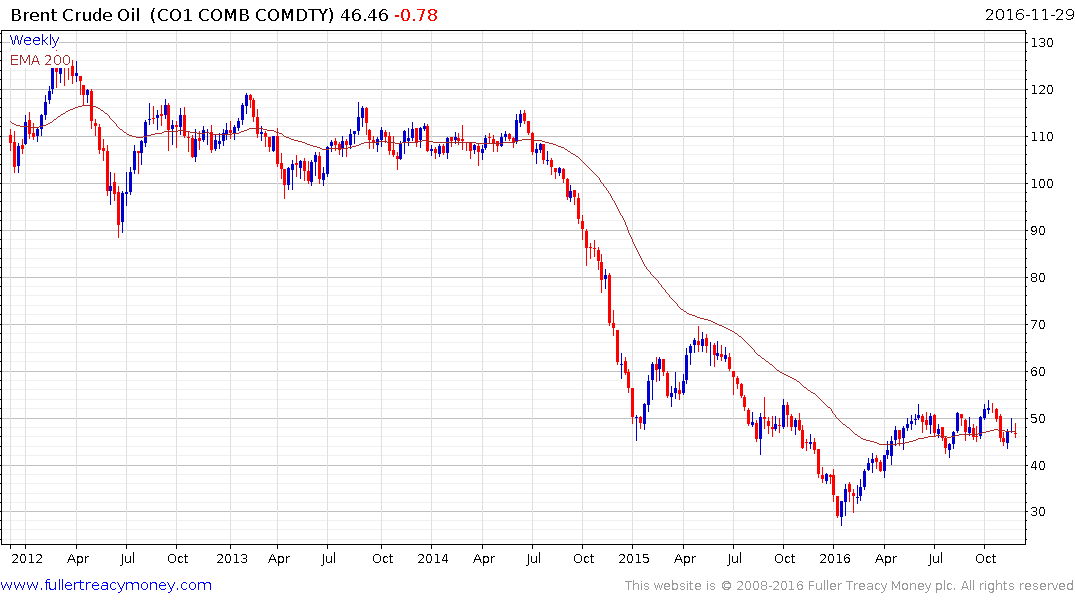Musings From the Oil Patch November 29th 2016
Thanks to a subscriber for this edition of Allen Brooks’ ever interesting report for PPHB. Here is a section:
You read it here first – tomorrow the members of the Organization of Petroleum Exporting Countries (OPEC) will announce an agreement to limit its output. You will have to wait for the details, and more importantly you will have to wait to see whether OPEC members actually do what they say they will do. For those of us who have seen this show before (often with even greater drama/showmanship), the issues with every OPEC agreement are the details and then its execution. Often the details and the execution are not what the public is led to expect at the time of the announcement.
OPEC has little choice at this point but to attempt to salvage some degree of respectability, especially following the debacle of the Doha meeting last spring at which a preconceived agreement blew up at the last minute. We are not going to debate the viability of OPEC as a cartel – to us it has always been an excuse to travel to Vienna and Europe for shopping and partying. On the other hand, OPEC does play an important role in helping to corral a number of important crude oil producers into supposedly one voice, although the power of that voice has been diminished by the evolution of energy markets over the last 25 years, and especially in the last few years.
The key factor for the oil market that OPEC understands is that it is in a recovery mode. That is not due to a miracle, or can be attributed to the efforts of anyone in particular. Rather, it is the result of economic discipline being restored to the oil market. Fewer uneconomic prospects are being drilled. Assets are moving from weak hands into stronger hands – hands that don’t necessarily have to drill in order to generate revenue to attempt to keep the doors of the companies open.
Additionally, companies are figuring out how to operate more efficiently – fewer employees, more efficient operations and employing greater technology. Producers at the moment have benefited from destroying the pricing structure of the oilfield service industry, enabling the producers to lower operating costs. The producers have driven oilfield service company prices down to levels that are not sustainable for the long-term. Short-term gains for producers will have to yield to higher oilfield service prices if the producers wish to have the equipment, technology and employees that deliver the field services that they need. The question becomes how quickly oilfield service prices rise and how much of those increases can be offset by further efficiency gains.
Here is a link to the full report.
This is a logical argument. If OPEC cannot act in unison to fulfil its role as a swing producer then what purpose does the group have as anything more than a talking shop? If they fail to announce a deal it will signal the group’s increasing irrelevance so they have little choice but to announce something. Quite whether they can succeed in implementing anything is another subject entirely.
More than ever before the cartel faces a crisis from the realistic argument that oil is approaching peak demand. The plastics, pesticides, fertiliser, detergent, rubber, asphalt, paint, jet fuel and other sectors are highly dependent on oil and gas. That is unlikely to change any time soon. However ground transportation is evolving rapidly and the growth rate of electric vehicles means they will take an increasingly large chunk of demand away from oil within a decade.
It’s worth remembering that the Jevon’s Paradox suggests demand is unlikely to decline in absolute terms because the number of potential uses for the commodity are likely to increase. After all, the advent of oil did not displace coal, in fact it enhanced living standards to such an extent that demand went up. Something that does not appear to have been overly discussed is that if electric vehicles represent an increasingly large part of the energy mix, it frees up oil for other uses that may not have been viable because it was essential for transportation. The question of utility of course depends on price.

Oil has predictably been ranging since its surge at the beginning of the year. A great deal of supply becomes uneconomic below $40 and $60-70 is where a lot of unconventional supply becomes economic. Therefore it is reasonable to expect a great deal of ranging over the coming years as the above issues play out. Right now prices are towards the lower side of that band.


